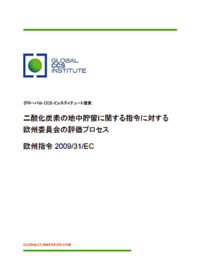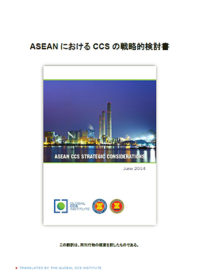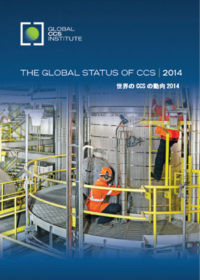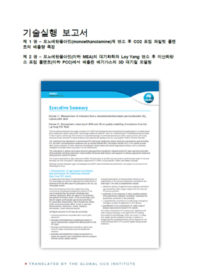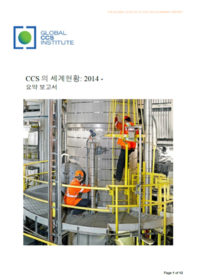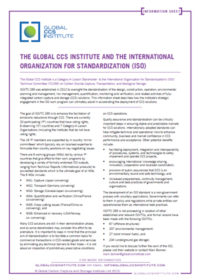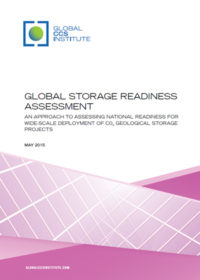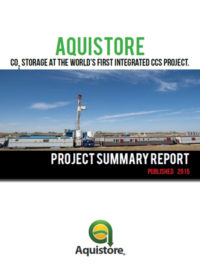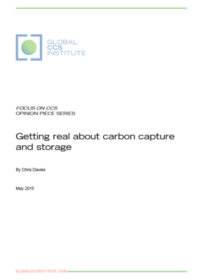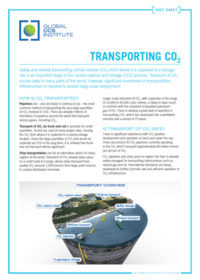Resources
Publications
Our publications, reports and research library hosts over 500 specialist reports and research papers on all topics associated with CCS.
View our Publication Library Disclaimer.
Filter by
グローバルCCSインスティテュート提言: 二酸化炭素の地中貯留に関する指令に対する欧州委員会の評価プロセス欧州指令2009/31/EC
11th June 2015
Topic(s): Carbon capture use and storage (CCUS), Policy law and regulation
インスティテュートは、欧州委員会(EC)から利害関係者への要求、すなわちCO2の地中貯留に関するEU指令2009/31/EC(CCS指令)の施行の見直し作業に参加し、欧州におけるCCSの普及と実現政策の状況を評価する要請に応じ本提言を作成した。本提言では「CCS指令の適用に関する考察」、「欧州のCCSの普及と実現政策に関する考察 」、「CCS指令の実施以降のCCS技術の技術的パフォーマンスとコストの進捗に関する考察」について述べている。
Japanese translation of Global CCS Institute submission to: the European Commission’s evaluation process of the Directive on the Geological Storage of Carbon Dioxide Directive 2009/31/EC.
Disclaimer
The content within the Global CCS Institute Publications, Reports and Research Library is provided for information purposes only. We make every effort and take reasonable care to keep the content of this section up-to-date and error-free. However, we make no claim as to its accuracy, currency or reliability.
Content and material featured within this section of our website includes reports and research published by third parties. The content and material may include opinions and recommendations of third parties that do not reflect those held by the Global CCS Institute.
「CCSの戦略的検討書」は、ASEANの政策決定者たちがCCSについて議論しやすくするために、グローバルCCSインスティテュートとASEANエネルギーセンターにより作成されたものである。本書は、CCSの世界的な状況、コスト、回収技術、貯留、法的や規制的発展および市民参加など、CCSに関連する重要な幾つかの事項に関する内容を記載している。また、ASEAN地域におけるCCSの概要を説明しており、また今後、同地域のCCS展開に向けた適切な条件設計を支援するためのステップを提案した内容となっている。
Japanese abridged translation of ASEAN CCS strategic considerations.
Disclaimer
The content within the Global CCS Institute Publications, Reports and Research Library is provided for information purposes only. We make every effort and take reasonable care to keep the content of this section up-to-date and error-free. However, we make no claim as to its accuracy, currency or reliability.
Content and material featured within this section of our website includes reports and research published by third parties. The content and material may include opinions and recommendations of third parties that do not reflect those held by the Global CCS Institute.
我々は、気候変動の緩和に対する最小コストアプローチの一環として、いかにCCSを最適な形で展開できるかについて議論する時期に入っている。当インスティテュートは55件の大規CCSプロジェクトを確認しているが、これらプロジェクトの実現を後押しするための行動が今まさに求められている。
「世界のCCSの動向2014」では、これら開発計画段階にあるCCSプロジェクトの詳細について記載すると共に、プロジェクトの実現を後押しするための行動について検討・分析を行っている。また、将来のCCS展開に関して、CCS開発の対象となる産業と地域の幅を広げつつ次世代のプロジェクトを育てるための基盤作りに必要な活動について検討・分析を行っている。
Japanese translation of The Global Status of CCS: 2014
Disclaimer
The content within the Global CCS Institute Publications, Reports and Research Library is provided for information purposes only. We make every effort and take reasonable care to keep the content of this section up-to-date and error-free. However, we make no claim as to its accuracy, currency or reliability.
Content and material featured within this section of our website includes reports and research published by third parties. The content and material may include opinions and recommendations of third parties that do not reflect those held by the Global CCS Institute.
기술실행 보고서. 모노에탄올아민
4th June 2015
Topic(s): Carbon capture use and storage (CCUS), CO2 capture, Health safety and environment
기술실행 보고서
제 1 권 – 모노에탄올아민(monoethanolamine)계 연소 후 CO2 포집 파일럿 플랜트의 배출량 측정
제 2 권 – 모노에탄올아민(이하 MEA)의 대기화학과 Loy Yang 연소 후 이산화탄소 포집 플랜트(이하 PCC)에서 배출된 배기가스의 3D 대기질 모델링
이 문서는 호주연방과학원(이하 CSIRO)이 주도한 아민계 연소 후 이산화탄소포집 기술의 대기질 영향에 대한 조사의 주요 결과를 요약한 것이다. 포집 공정의 환경 영향에 대한 지식을 확대하기 위하여 국제탄소포집저장연구소(Global Carbon Capture and Storage Institute: 이하 GCCSI)가 시작한 이 연구는 실제 배출량을 측정하였으며, 호주 빅토리아주에 위치한 AGL의 Loy Lang PCC 플랜트에서 대기질(air quality)에 대한 사례연구(case study)를 제공하고 있다.
Korean Translation of the Executive Summary of CSIRO Report Assessing atmospheric emissions from an amine-based CO2 post-combustion capture processes and their impacts on the environment: a case study.
Disclaimer
The content within the Global CCS Institute Publications, Reports and Research Library is provided for information purposes only. We make every effort and take reasonable care to keep the content of this section up-to-date and error-free. However, we make no claim as to its accuracy, currency or reliability.
Content and material featured within this section of our website includes reports and research published by third parties. The content and material may include opinions and recommendations of third parties that do not reflect those held by the Global CCS Institute.
2014년 10월, 캐나다 서스캐처원(Saskatchewan)의 바운더리 댐(Boundary Dam) 발전소에서 발전분야 세계 최초의 대규모 탄소 포집 및 저장 (CCS) 프로젝트가 시작되었다. 추가적으로 두 개의 대규모 전력분야 CCS 프로젝트인 미시시피의의 켐퍼 카운티 에너지 시설(Kemper County Energy Facility)과 텍사스의 페트라 노바 탄소포집 프로젝트(Petra Nova Carbon Capture Project)가 각각 2015년과 2016년에 가동될 계획이다. 철강 분야에서 세계 최초의 대규모 CCS 프로젝트인 아랍 에미리트 연합(UAE)의 아부다비 CCS 프로젝트에 대한 건설작업이 진행 중이다. 이 4개의 프로젝트는 전세계에서 가동 중이거나 건설 중인 22개의 대규모 CCS 프로젝트 중 일부이다. 이는 2010년에 비해 두 배로 증가한 것이다.
Korean translation of The Global Status of CCS: 2014 Summary Report.
Disclaimer
The content within the Global CCS Institute Publications, Reports and Research Library is provided for information purposes only. We make every effort and take reasonable care to keep the content of this section up-to-date and error-free. However, we make no claim as to its accuracy, currency or reliability.
Content and material featured within this section of our website includes reports and research published by third parties. The content and material may include opinions and recommendations of third parties that do not reflect those held by the Global CCS Institute.
The Global CCS Institute and the International Organization for Standardization (ISO)
2nd June 2015
Topic(s): Carbon capture use and storage (CCUS)
This information sheet describes the Global CCS Institute’s relationship with the International Organization for Standardization as a stakeholder on the Technical Committee on Carbon Dioxide Capture, Transportation, and Geological Storage.
Disclaimer
The content within the Global CCS Institute Publications, Reports and Research Library is provided for information purposes only. We make every effort and take reasonable care to keep the content of this section up-to-date and error-free. However, we make no claim as to its accuracy, currency or reliability.
Content and material featured within this section of our website includes reports and research published by third parties. The content and material may include opinions and recommendations of third parties that do not reflect those held by the Global CCS Institute.
Global storage readiness assessment: an approach to assessing national readiness for wide-scale deployment of CO2 geological storage projects
29th May 2015
Topic(s): Carbon capture use and storage (CCUS), CO2 storage, Policy law and regulation
Lead Author Christopher P Consoli presents this methodology that assesses any given nation’s readiness for large-scale carbon dioxide (CO2) geological storage projects, as part of the wide-scale deployment of carbon capture and storage (CCS) projects. The Global CCS Institute’s assessment method enables a consistent and repeatable framework using a weighted set of criteria for transparency and accountability that can be updated as necessary to revise assessments and to include new nations.
This storage assessment complements the CCS Policy Indicator (CCS-PI) previously published by the Global CCS Institute in 2013 to compare levels of national policy support for CCS. Together, these two assessments work to highlight the global progression of CCS. This assessment is a living document designed to reflect the evolution of CCS and will be updated regularly.
Disclaimer
The content within the Global CCS Institute Publications, Reports and Research Library is provided for information purposes only. We make every effort and take reasonable care to keep the content of this section up-to-date and error-free. However, we make no claim as to its accuracy, currency or reliability.
Content and material featured within this section of our website includes reports and research published by third parties. The content and material may include opinions and recommendations of third parties that do not reflect those held by the Global CCS Institute.
Aquistore: CO2 storage at the world’s first integrated CCS project. Project summary report
18th May 2015
Topic(s): Carbon capture use and storage (CCUS), CO2 storage
The Global CCS Institute commissioned the Petroleum Technology Research Centre (PTRC) in 2013 to provide a summary report on the Aquistore project, a CO2 geological storage site located near the town of Estevan in southern Saskatchewan, Canada. Aquistore will be used by owner/operator SaskPower as a dedicated geological storage option for CO2 captured from the nearby Boundary Dam Power Station - the location of the world’s first commercial scale post-combustion capture of CO2 from coal fired power generation.
Disclaimer
The content within the Global CCS Institute Publications, Reports and Research Library is provided for information purposes only. We make every effort and take reasonable care to keep the content of this section up-to-date and error-free. However, we make no claim as to its accuracy, currency or reliability.
Content and material featured within this section of our website includes reports and research published by third parties. The content and material may include opinions and recommendations of third parties that do not reflect those held by the Global CCS Institute.
Getting real about carbon capture and storage
14th May 2015
Topic(s): Carbon capture use and storage (CCUS)
Chris Davies’ article, Getting real about carbon capture and storage, is part of an opinion leader’s article series for Focus on CCS. The series features contributions from world leading authorities on carbon capture and storage (CCS), presenting their perspectives on the role for the technology in reducing our carbon dioxide emissions. The series is published by the Global CCS Institute to contribute to the conversation about CCS within the portfolio of options to help tackle climate change.
Chris Davies was a United Kingdom member of the European Parliament from 1999-2014. He served as rapporteur for the CCS Directive in 2008-9 and for the Parliament’s implementation report on CCS in 2013-14. He introduced and promoted the idea for a European funding mechanism that became known as the NER300, one of the world’s largest funding programs for innovative low-carbon energy demonstration projects.
Disclaimer
The content within the Global CCS Institute Publications, Reports and Research Library is provided for information purposes only. We make every effort and take reasonable care to keep the content of this section up-to-date and error-free. However, we make no claim as to its accuracy, currency or reliability.
Content and material featured within this section of our website includes reports and research published by third parties. The content and material may include opinions and recommendations of third parties that do not reflect those held by the Global CCS Institute.
This fact sheet by the Global CCS Institute describes how carbon dioxide is safely transported during the carbon capture and storage process.
Disclaimer
The content within the Global CCS Institute Publications, Reports and Research Library is provided for information purposes only. We make every effort and take reasonable care to keep the content of this section up-to-date and error-free. However, we make no claim as to its accuracy, currency or reliability.
Content and material featured within this section of our website includes reports and research published by third parties. The content and material may include opinions and recommendations of third parties that do not reflect those held by the Global CCS Institute.
The Global CCS Institute and the Climate Technology Centre and Network (CTCN)
7th May 2015
Topic(s): Carbon capture use and storage (CCUS)
This information sheet describes how the Global CCS Institute assists the Climate Technology Centre and Network with carbon capture and storage matters.
Disclaimer
The content within the Global CCS Institute Publications, Reports and Research Library is provided for information purposes only. We make every effort and take reasonable care to keep the content of this section up-to-date and error-free. However, we make no claim as to its accuracy, currency or reliability.
Content and material featured within this section of our website includes reports and research published by third parties. The content and material may include opinions and recommendations of third parties that do not reflect those held by the Global CCS Institute.
This fact sheet from the Global CCS Institute describes how carbon capture and storage can be applied to power production and other industrial applications.
Disclaimer
The content within the Global CCS Institute Publications, Reports and Research Library is provided for information purposes only. We make every effort and take reasonable care to keep the content of this section up-to-date and error-free. However, we make no claim as to its accuracy, currency or reliability.
Content and material featured within this section of our website includes reports and research published by third parties. The content and material may include opinions and recommendations of third parties that do not reflect those held by the Global CCS Institute.
